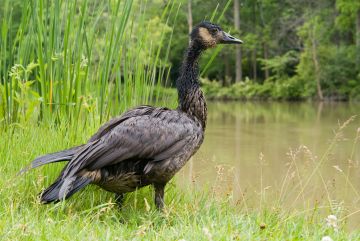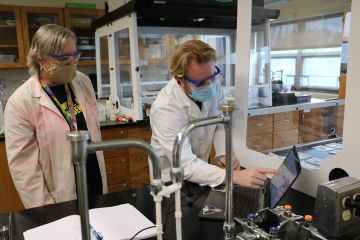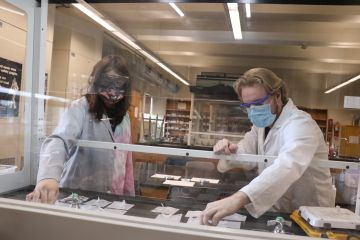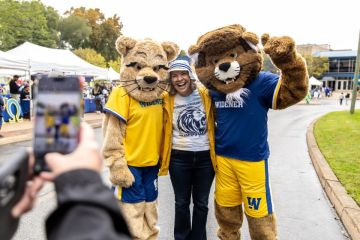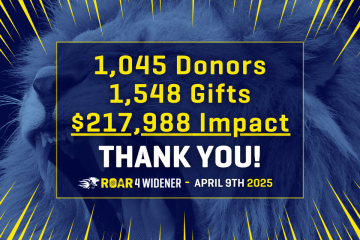A Bird’s-Eye View of Summer Research: Students Test Detergents to Save Wildlife Affected by Oil Spills

Oil spills can be devastating to wildlife and the environment. Birds, especially, are vulnerable to oil, which sticks to their feathers, causing matting that can impair waterproofing and expose their sensitive skin to temperature extremes.
Dawn dish detergent has long been considered the best way to clean contaminated birds, but a faculty-student research team in the College of Arts and Science is testing a number of detergents to determine their effectiveness and possibly find a ‘greener’ option. The research is being conducted as part of a new partnership with Tri-State Bird Rescue & Research, Inc.
The team of three undergraduate students, led by Chemistry Department Chair and Associate Professor Andrea Martin, are spending the summer in the Kirkbride Hall laboratory coating feathers with vegetable- and petroleum-based oils and then blind testing detergents and degreasers. An infrared machine allows them to determine if oil remains on the feathers after the cleaning.
“To do research that is cutting edge and also down to earth is really neat,” said Autumn Weber, a chemistry and chemical engineering dual major. “We are working as a team and learning from Dr. Martin, but also have our own ideas and can take the research in many directions.”
This research is one of many projects at Widener being conducted this summer through the Summer Undergraduate Research and Creative Activities (SURCA) program, which has for years supported undergraduate research and sharing across disciplines. The students present their research findings at the SURCA Symposium during the fall semester.
“Undergraduate research is a distinguishing feature of the chemistry curriculum at Widener,” Martin said. “We know that research opportunities and partnerships are transformative for students, allowing them to put their classroom knowledge to use in addressing real-world problems.”
A Collaboration to Save Birds
Tri-State Bird Rescue & Research has been providing rehabilitation to injured and orphaned wild birds and responding to wildlife affected by oil spills since 1976.
Located in Newark, Delaware, Tri-State previously partnered with the chemical company DuPont to test over 100 products to determine which was most effective for removing oil from feathers.
Now, that research has transferred to Widener, where Martin and the chemistry students are continuing this important work for Tri-State.
“When [Assistant Teaching Professor] Robert Mishur and I heard about Tri-State’s need for a new research partner, we thought ‘we can do this work at Widener,’” Martin said. “I’ve been doing research with students for a long time, and Widener already had the chemical instrumentation.”
Tri-State Executive Director Lisa Smith said they are excited to be working with Widener on this project.
“I love the enthusiasm the students and Dr. Martin are bringing to the work, and as always, any advancements we can make in safely and effectively removing contaminants from feathers is a win for wildlife,” Smith said.
Back in the Lab
Initially, the students began their research at home due to COVID-19 safety measures. They read extensively about oil spills and studied how detergents work.
The time at home was actually a blessing in disguise – the students came in with far more background knowledge than they would have had if we had started right away in the lab." - Associate Professor Andrea Martin
By July, the students safely returned to campus with face masks and social distancing protocols in place. Their experiments are now well underway as they test 12 detergents and degreasers on feathers coated in five different vegetable-based cooking oils. They’ll later reproduce this work with feathers coated in synthetic petroleum oil.
“Coming back into the lab feels right,” said Tyler Apple, a rising junior chemical engineering and chemistry dual major. “When you are in the lab for two years, you know what you are doing and it feels good to be back doing that with a team.”
The students say the research is building on what they’ve learned in their chemistry classes, or in some cases, haven’t even learned yet.
For instance, Weber, a rising sophomore, will take an organic chemistry course this fall, but is already using principles from that course, as well as the infrared machine, daily.
“I don’t always know the background, but I ask the upperclassmen for help or I read on the side,” Weber said. “I’m really starting to get a sense of how the infrared machine works.”
Noah Smeriglio, a rising junior chemistry and chemical engineering dual major, said everyone on the team is naturally curious and willing to branch in new directions based on the research findings and their own career goals.
“I want to pursue a career in environmental engineering related to waste water treatment,” Smeriglio said. “This research is a good steppingstone to get into the world of environmental chemistry.”
As the research continues, the students want to compare natural, plant-based soaps to traditional detergents to determine their effectiveness. Ironically, Dawn’s effectiveness comes from the fact that its grease-fighting ingredient is based on petroleum – the very substance being cleaned from the feathers.
Using more natural soaps would be “in line with Widener’s green chemistry philosophy,” Weber said.
